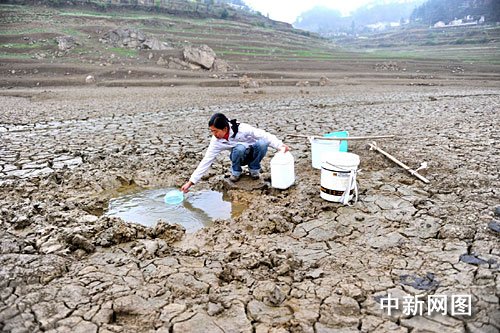(Ecns.cn) -- A long-lasting drought has left over 2 million people short of drinking water in Southwest China's Guizhou Province, the provincial civil affairs bureau said in a statement on August 12.
According to the provincial flood control and drought relief headquarters, the province has been gripped by drought since early July, with rainfall last month 69.8 percent less than the average.
As of Friday, over 2.15 million people in 84 of the province's cities and counties were suffering from drinking water shortages, said the statement.
The drought has also affected 1.05 million hectares of crops and left 760,000 livestock short of drinking water, causing direct economic losses of more than 6 billion yuan ($923 million).
The province will deploy artificial rain to ease the drought, said the statement.
The Civil Affairs Bureau said it had allocated funds to ensure drinking water supplies for local residents. The province's agriculture departments are also helping farmers pump water out of the ground to save crops.
A technical problem
Guizhou is not a province that lacks water – residents often use the phrase "there are never three fine days in a row in Guizhou" to describe the province's rainy weather. In fact, Guizhou has 984 rivers (each longer than 10 kilometers) and annual precipitation of 1,179 millimeters – twice as much as Beijing.
But the drought pestering Guizhou is a technical problem, not a natural one.
An underdeveloped province, Guizhou has no major water projects due in part to its widespread and highly porous karst topography, but also to lack of money. The province has only 34 medium-sized reservoirs, which amounts to one reservoir for 2.6 counties on average. It also has more than 10,000 small reservoirs, many of which are dilapidated with age, but their total storage capacity is less than 2 billion cubic meters.
According to some experts, lack of reservoirs is the culprit for Guizhou's drought problem.
"It is an engineering drought," said Su Weici, of the research Center of Environment and Development of Karst Resources.
According to Su, 92.5% of Guizhou is covered by hills, which means the soil has a weaker capacity to retain water. "All the water is going either to the valleys or into underground rivers," he said.


















